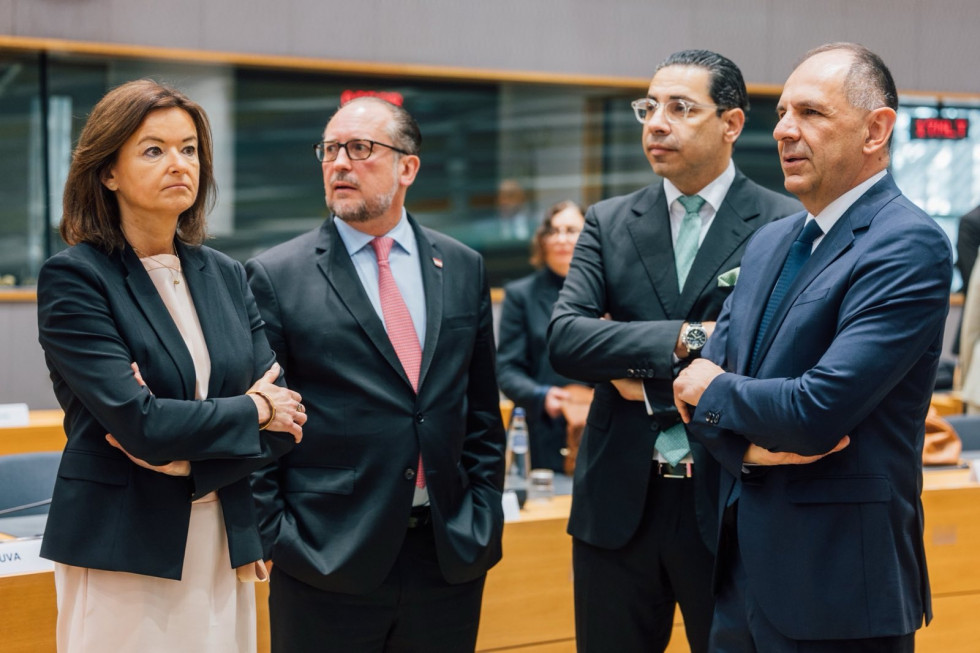Minister Fajon: I strongly condemn the Israeli attack on the Rafah refugee camp

Minister Fajon at the EU Foreign Affairs Council meeting with other Foreign Ministers | Author Ministrstvo za zunanje in evropske zadeve
Minister Fajon reiterated that any attack against civilians, such as the one that occurred on Sunday 26 May 2024, is inadmissible. "I strongly condemn last night's Israeli attack on displaced Palestinians, in which many children were burned to death. At the Foreign Affairs Council in Brussels, I will insist on respect for international humanitarian law and the rulings of the International Court of Justice. If violations continue, the EU must respond in a united and resolute manner, including through sanctions," she said ahead of the meeting.
The May EU Foreign Affairs Council focused on the conflict in the Middle East. The day before, more than 20 countries (including Austria, Sweden, Egypt, Indonesia, Switzerland, Jordan, Slovenia etc.) gathered in Brussels for a ministerial meeting under the auspices of Norway and Saudi Arabia to discuss the possibilities and efforts to achieve a two-state solution – Israel and Palestine – and the recognition of the state of Palestine. The discussions continued at the EU Foreign Affairs Council, where Minister Tanja Fajon called for the rulings of the International Court of Justice to be respected: "Slovenia consistently calls for full and unconditional respect for international law and is a vocal supporter of all international courts and tribunals. Respect for their decisions is key to ensuring the international rule of law. The ICJ’s rulings are binding and must be fully and effectively implemented. Moreover, as States Parties to the Genocide Convention, we all have an obligation to ensure that these interim measures are respected". She added that Slovenia welcomed further interim measures by the International Court of Justice ordering Israel to immediately cease its military offensive in Rafah. "Anything else will put the civilian population at extreme risk of mass starvation and disease," she told the EU Foreign Affairs Council, adding: "Everything must be done to prevent an escalation of violence in the West Bank".
Minister Fajon argued that if violations of international court rulings continue, the EU should respond in a united and firm manner, including by considering restrictive measures.
For the opening session of the debate on the Middle East, the EU foreign ministers were joined by their counterparts from Saudi Arabia, Jordan, Egypt, Qatar and the United Arab Emirates and the Secretary General of the Arab League. Ministers from the region gave a detailed presentation on the Arab Peace Plan and shared their views on the current situation. "The Arab partners are key in the quest for peace in the Middle East and the two-state solution. But the EU must also step up its efforts to help strengthen the Palestinian Authority," she added, echoing the view of High Representative of the European Union for Foreign Affairs and Security Policy Josep Borell, who chairs the Foreign Affairs Council, that reforms of the Palestinian Authority are important to improve accountability, democratic legitimacy, efficiency and governance in the West Bank and, after the end of the war, in Gaza. Fajon reiterated Slovenia's commitment to the process of recognition of Palestine, which the Slovenian government launched on 9 May 2024 and intends to finalise as soon as possible. A two-state solution is the only political solution that would help bring peaceful coexistence and security to both Israelis and Palestinians.
She stressed that the suffering of the people of Gaza continues and insisted that the killing must stop and that the crossing points must be opened for the delivery of humanitarian aid.
Discussing Russia’s aggression against Ukraine, the ministers exchanged views on further support and assistance to Ukraine in the light of the dire situation on the battlefield and the search for a peace formula for Ukraine. "Our priorities are peace-building and respect for the United Nations Charter. Russia cannot dictate the terms, but when the time is right it should be part of the negotiations on peace and the European security architecture. We need to convince global partners that our goal is peace, not war," she said, expressing Slovenia's hope that the high-level summit on peace in Ukraine to be held in Switzerland on 15-16 June will be well attended.

